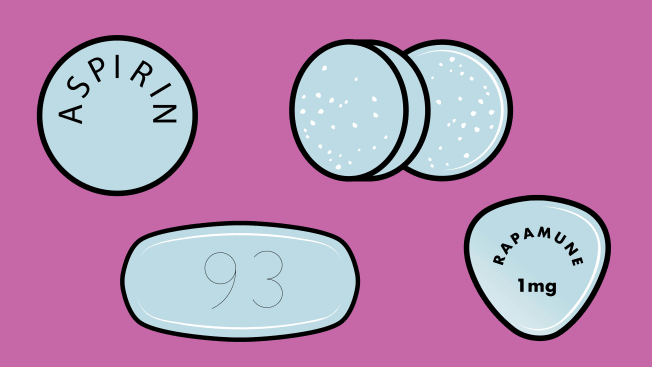There’s promising but preliminary research behind a few anti-aging meds. But most products don’t live up to their claims.

By Kevin Loria
We’d all like to find “that magic pill where we don’t get older, don’t feel worse, and have more energy all the time,” says Anne R. Cappola, MD, a professor of medicine at the University of Pennsylvania’s Perelman School of Medicine. Could these substances have potential?
Aspirin
This over-the-counter pain pill has long been used to lower heart attack and stroke risks. But regular use can cause side effects like bleeding. People with cardiovascular disease (CVD), especially those who’ve already had a heart attack or stroke, should continue a daily low dose. But experts say some 40- to 59-year-olds without CVD may see only a small benefit, so they should talk with their doctors. People 60 and older with no CVD shouldn’t start an aspirin regimen because bleeding risks probably outweigh the benefits.
Metformin
This prescription drug for type 2 diabetes is linked to a reduced incidence of cancer, improved heart health, and some cognitive protection. In animal studies, it appears to extend life span and health. Researchers are exploring whether it might do the same for people, but they don’t know if long-term use is healthy for everyone or how to reduce side effects such as diarrhea.
Prevagen
This supplement is widely marketed as a memory booster. But some doctors say it’s overhyped and unproven. Its makers have settled several lawsuits regarding their marketing assertions. And in an ongoing government case, they’ve been charged with making deceptive health claims. As with other supplements, like Focus Factor and Neuriva, Prevagen’s makers did not have to prove its efficacy and safety before putting it on the market.
Rapamycin
Discovered in Easter Island soil, this molecule is now a prescription drug given to kidney transplant patients. Rapamycin appears to activate the same pathways as calorie restriction, which extends life in animal studies. Early evidence suggests that it may help prevent some cancers and improve cardiovascular function—at least in mice. But its immune-suppressing effects may weaken your defenses against infection.
Editor’s Note: This article also appeared in the September 2023 issue of Consumer Reports magazine.
Consumer Reports is an independent, nonprofit organization that works side by side with consumers to create a fairer, safer, and healthier world. CR does not endorse products or services, and does not accept advertising. Copyright © 2023, Consumer Reports, Inc.
This content was originally published here.




















